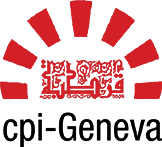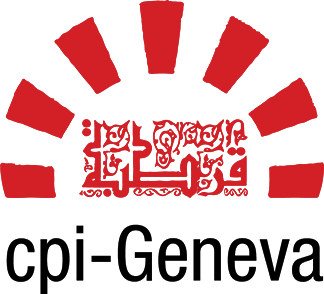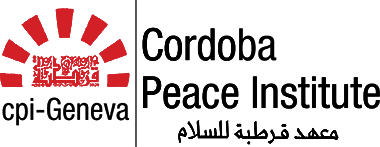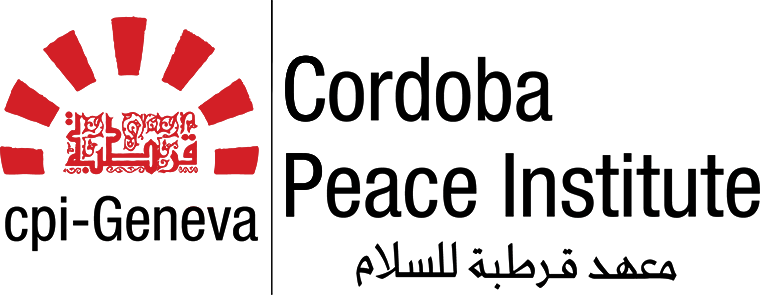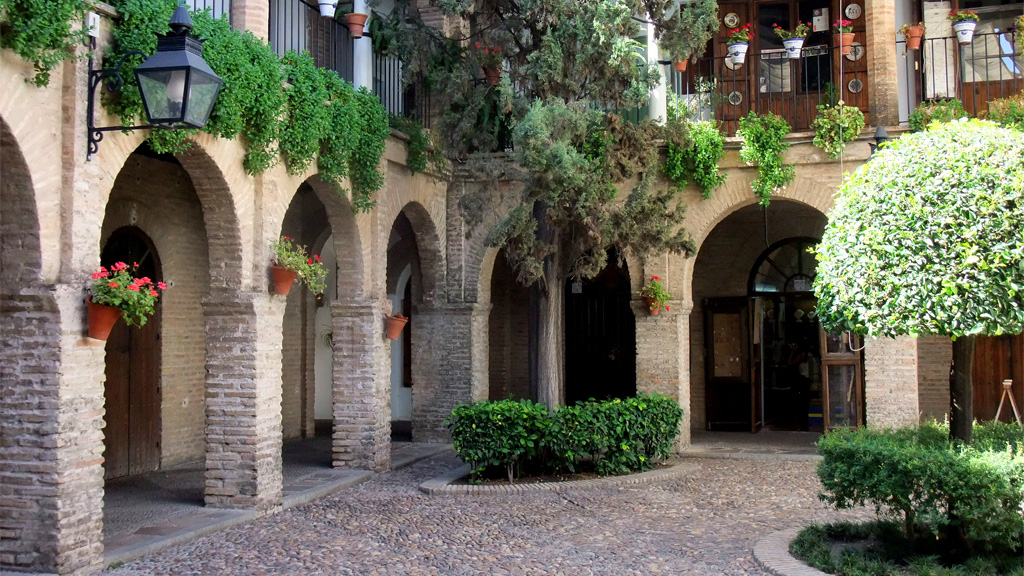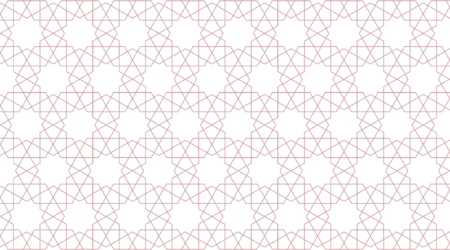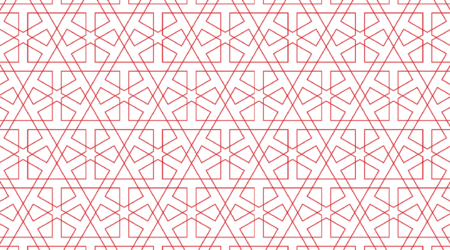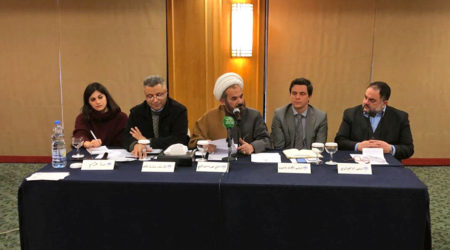The Cordoba Update 6/2017
|
The bi-weekly CORDOBA UPDATE is the product of continuous monitoring work, carried out by the Cordoba Foundation of Geneva team. By analysing and reporting on key events and trends in the Foundation’s areas of interest, we aim to draw readers’ attention to pertinent developments in North Africa, the Sahel, West Asia and Europe, which are not always covered in ‘mainstream’ media. In addition to sharing news from these four regions, the Cordoba Update is an opportunity for the Foundation to provide regular updates on its publications, events and other developments. In line with the programmes and projects funded by partners of the Cordoba Foundation of Geneva, updates and information are included under the following themes:
For questions and/or feedback regarding the content and form of the Cordoba Update, please contact Sarah Franck: sarah.franck@cordoue.ch Le CORDOBA UPDATE est un bimensuel qui présente le travail continu de suivi réalisé par l’équipe de la Fondation Cordoue de Genève. Par l’analyse des événements et tendances qui concernent les domaines d’intérêt de la Fondation, nous visons à attirer l’attention de nos lecteurs sur les développements pertinents en Afrique du Nord, dans le Sahel, en Asie de l’Ouest et en Europe, une actualité qui n’est pas toujours couverte dans les médias dits ‘traditionnels’. Outre le partage de l’actualité de ces quatre régions, le « Cordoba Update » est un moyen pour la Fondation de fournir des mises à jour régulières sur ses publications, événements et autres développements. En accord avec les programmes et projets financés par les partenaires de la Fondation Cordoue de Genève, les mises à jour et informations concernent les thèmes suivants :
Pour des questions et / ou des commentaires concernant le contenu et la forme du Cordoba Update, veuillez contacter Sarah Franck : sarah.franck@cordoue.ch |
EVENTS / EVENEMENTS
Doha: Conference on International Humanitarian Action, Cooperation for Humanity
From 26-27 March 2017, the Conference on International Humanitarian Action was held in Doha, Qatar, with the aims of strengthening cooperation, building partnerships in the field and seeking funding for joint projects in the field of humanitarian action between organisations of different backgrounds and worldviews. The Cordoba Foundation of Geneva acted as technical advisor to the conference, which brought together 200 participants including representatives of more than 70 aid agencies from Asia, Africa, Europe and America, representatives of the United Nations, the Organisation of Islamic Cooperation and the Arab League, and a number of diplomats and academics.
The conference explored challenges to cooperation in the humanitarian field and aimed to offer practical solutions through joint partnerships in the field, in sessions entitled: ‘Cooperation in the humanitarian field: challenges and opportunities;’ ‘The war on terror and international designations: impact on humanitarian cooperation;’ and ‘Humanitarian cooperation: past/ongoing experiences and future perspectives.’
The speakers and participants of the conference produced nine recommendations at the end of the two-day event, among which was the establishment of the « Geneva Platform for the Work of Goodness. » The Platform will be the practical product of the conference that brought together representatives of organisations from East and West, in the interest of humanity.
For full details of the Doha conference recommendations, please visit the Cordoba Foundation of Geneva website:
http://cordoue.ch/human-security/humanitarian-work/itemlist/category/224-conference-on-international-humanitarian-work
For more information on the Doha conference, please see:
http://www.aljazeera.net/news/reportsandinterviews/2017/3/26/
http://www.aljazeera.net/news/reportsandinterviews/2017/3/27
Maroc, 1-2.04.2017 : Espace de médiation entre acteurs avec des inspirations et des référentiels idéologiques différents autour de la condition des femmes au Maroc
Depuis octobre 2015, la Fondation Cordoue de Genève en partenariat avec le Département fédéral des affaires étrangères suisse a mené un projet de médiation entre des acteurs représentant les inspirations et les référentiels idéologiques différents présents au sein de la société marocaine en vue d’une collaboration pratique autour de la question de la situation des femmes au Maroc. En effet, les polarisations entre les adhérents à différentes idéologies sont importantes au Maroc au point de représenter des obstacles au travail pour l’intérêt commun de la société. Les buts de ce projet, la réduction de la polarisation séculiers-islamistes et la promotion d’une société inclusive, étaient dès lors d’autant plus pertinents en ce qu’ils visaient à regrouper des représentants des inspirations et référentiels idéologiques différents autour d’une question d’intérêt commun, en l’occurrence la question de la situation des femmes au Maroc.
Le projet a vu sa première phase se terminer lors d’un atelier tenu à Marrakech du 1 au 2 avril 2017. Une atmosphère positive et engagée a caractérisé cette réunion. En effet, depuis octobre 2015, de nombreux changements ont pu être observés et confirmés par les participants. D’un état de méfiance, les attitudes des uns envers les autres ont évolué à travers le processus jusqu’à atteindre un point où un fort esprit d’équipe avec des démonstrations de solidarité au-delà des différentes affiliations a pris forme. Les visions que chacun avait de « l’autre » se sont modifiées, changements vécus avec enthousiasme parmi les participants.
A la fin de cette première phase, les participants se sont dits motivés à continuer un travail ensemble. En effet, ils ont exprimé le souhait d’élargir cette expérience et de la faire connaître à un plus large public.
Liban, 29.03.2017 : Collaboration intercommunautaire philanthropique en faveur des réfugiés syriens
La Fondation Cordoue de Genève en partenariat avec le Département fédéral des affaires étrangères suisse a effectué une mission à Beyrouth entre le 28 et le 30 mars 2017.
Le but du « Projet Liban » du programme « Moyen Orient » est de promouvoir l’interaction pacifique entre les communautés libanaises de différentes confessions, de faciliter des actions entreprises conjointement par celles-là et de promouvoir le sens de l’intérêt commun et de la citoyenneté dans la société libanaise.
Cette mission avait pour but de suivre les projets en œuvre, dont le projet de collaboration entre organisations travaillant en faveur des réfugiés syriens au Liban.
ISLAMIST-SECULAR RELATIONS / RELATIONS ENTRE SÉCULIERS ET ISLAMISTES
Maroc, 03.04.2017 : Nouveau gouvernement en perspective
Les délais demandés par le roi du Maroc ont été tenus par le nouveau premier ministre désigné, Saad Dine El Otmani. En effet, le Palais avait exprimé sa volonté de voir se former le nouveau gouvernement le plus vite possible – en quinze jours – le jour de la nomination du nouveau chef du gouvernement, à savoir le 17 mars 2017. Pari tenu donc, puisque El Otmani a informé, à la fin de semaine dernière, que la nouvelle coalition était formée suite aux rencontres avec chaque parti ayant eu des représentants élus aux dernières élections législatives en octobre 2016. Mettant fin à près de six mois de stagnation et de blocage et après seulement huit jours d’exercice, El Otmani a annoncé lors d’une conférence à Rabat qu’un accord a été trouvé entre six partis politiques pour former la prochaine coalition gouvernementale. Cette coalition inclus donc le parti d’El Otmani, le Parti justice et développement (PJD), ainsi que le Rassemblement national des indépendants (RNI), l’Union constitutionnelle (UC), le Mouvement populaire (MP), le Parti du progrès et du socialisme (PPS) et enfin l’Union socialiste des forces populaires (USFP), regroupant ainsi 240 des 395 sièges du parlement. L’inclusion de ce dernier parti socialiste était le principal désaccord, depuis les élections, qui a mené à l’éviction d’Abdelilah Benkirane. Aziz Akhannouch, président du RNI, a finalement eu le dernier mot, en ayant fait céder El Otmani à cette demande.
Reste donc maintenant à connaitre l’architecture de ce nouveau gouvernement. A cet effet, El Otmani a donné au roi sa liste de ministres proposés durant le weekend, que ce dernier devra annoncer officiellement, mercredi 5 avril. Pour l’heure, la presse croit déjà savoir que certains ministres retrouveront le même portefeuille qu’ils détenaient sous l’ancien gouvernement, alors d’autres garderont un poste ministériel mais dans un autre secteur. De plus, il a été communiqué que le nombre de portefeuilles ministériels a été revu à la baisse. En effet, selon les chiffres évoqués dans la presse locale la structure gouvernementale sera composée de 25 à 27 ministres et de 5 à 7 secrétaires d’Etat. La question du programme de cette coalition très hétérogène reste, pour l’heure, inconnue. Les grandes lignes devraient être préparées par une commission composée des représentants des six partis susmentionnés.
Aussi, de l’autre côté de l’hémicycle, la question se pose quant à l’opposition, seulement composée de deux partis, à savoir le Parti authenticité et modernité (PAM) et l’Istiqlal (PI). Ces deux partis ont souvent montré leur animosité l’un envers l’autre et n’ont explicitement pas le même agenda politique. C’est donc avec une coalition large et une opposition morcelée que le Maroc devra composer sa politique dans les cinq prochaines années à venir, si aucune élection anticipée n’est déclenchée.
Liens pour plus d’informations :
http://www.aljazeera.com/news/2017/03/pm-saad-eddine-el-othmani-forms-party-government
http://www.aljazeera.com/programmes/insidestory/2017/03/power-reside-morocco
http://www.huffpostmaghreb.com/jamal-eddine-felhi/six-partis-gouvernement-reste-concocter-programme
https://www.moroccoworldnews.com/2017/04/212691/saad-eddine-othmani-submits-list-ministers-royal-cabinet
http://www.huffpostmaghreb.com/2017/03/28/gouvernement-othmani-opposition
http://fr.le360.ma/politique/revelations-sur-larchitecture-du-gouvernement-del-othmani
http://fr.le360.ma/politique/le-gouvernement-el-othmani-est-pret
TRANSITION AND POLITICAL PARTICIPATION / TRANSITION ET PARTICIPATION POLITIQUE
Mauritanie, 28.02.17 : Le rejet des amendements constitutionnels par le Sénat brouille les cartes
Après avoir proposé un amendement constitutionnel devant porter des changements dans le drapeau et l’hymne national, entre autres, le président Ould Abdel Aziz a vu la majorité du Sénat se dresser contre lui. Echaudés par la suppression de leur chambre, ainsi que celle d’autres institutions, comme la Haute Cour de Justice et le Haut Conseil islamique, les Sénateurs ont fait avorter le plan présidentiel, installant ainsi une crise sérieuse au sein de la majorité présidentielle.
Déterminé à faire passer les amendements, le Président Mohamed Ould Abdel Aziz, se fondant sur l’article 38 de la Constitution, a décidé de convoquer un referendum populaire pour contourner le blocage sénatorial. Cette décision soulève une grande polémique dans le pays.
Selon les opposants au régime et certains acteurs de la majorité présidentielle, les articles indiqués pour les amendements constitutionnels sont les articles de 99 à 103 de ladite Constitution. Trois ex-présidents du pays ont soutenu cette interprétation. Les réseaux sociaux s’enflamment ; de nombreuses chansons sont composées pour contrer la détermination présidentielle et appeler le peuple à « résister » à la volonté de « passage en force » du Président de la République.
Entre-temps, le parti au pouvoir tente de réorganiser ses rangs et certains de ses militants ont déjà engagé, à l’intérieur, une lutte d’influence pour faire passer l’idée des amendements par le biais du peuple.
Liens pour plus d’informations :
http://www.cridem.org/C_Info.php?article=696473
http://www.cridem.org/C_Info.php?article=696442
http://www.cridem.org/C_Info.php?article=696371
http://www.cridem.org/C_Info.php?article=696370
http://www.cridem.org/C_Info.php?article=696344
Liban, 20.03.2017 : Les manifestants de You Stink référés à la cour civile
Les manifestants du mouvement populaire You Stink qui avaient protesté face à l’incapacité du gouvernement de résoudre la crise des déchets en 2015 et qui devaient être jugés devant une cour militaire (cf. Cordoba Update 2/2017) ont finalement vu leurs cas référés à une cour civile. Le 30 janvier dernier, la cour militaire devant les juger dans un contexte de forte indignation de la société civile, et notamment parmi les organisations défendant les droits de l’homme, avait reporté leur jugement au 20 mars. Il semble que les appels de leurs avocats aient été entendus puisque, le 20 mars passé, la cour militaire a déclaré que le jugement de ces manifestants ne relevait pas de sa juridiction.
Pour Human Rights Watch, cette nouvelle est un pas dans la bonne direction. Une des manifestantes a l’espoir que cette déclaration pourra constituer un précédent légal lors de cas futurs similaires. Cependant, alors que les 14 manifestants seront jugés pour émeutes et dommages à la propriété privée par des cours civiles, 5 d’entre eux devront quand même comparaître devant la cour militaire pour avoir résisté aux officiers de police voulant les arrêter. Alors que les organisations des droits de l’homme contestent le maintien de ces cas devant la cour militaire, ils réclament du parlement une loi excluant totalement les civils de la juridiction des cours militaires.
Liens pour plus d’informations :
https://www.hrw.org/news/2017/03/20/lebanon-military-court-backs-down-waste-protesters
http://stepfeed.com/some-protesters-are-now-being-tried-in-lebanon-s-civilian-court
RELATIONS BETWEEN COMMUNITIES OF DIFFERENT ETHNIC, CULTURAL AND RELIGIOUS AFFILIATIONS /
RELATIONS ENTRE COMMUNAUTÉS DE DIFFÉRENTES AFFILIATIONS ETHNIQUES, CULTURELLES ET RELIGIEUSES
Iraq, 21.03-03.04.2017: Ahead of Provincial Elections, Divisions Worsen within the Iraqi Political Community
The political controversy that has been steadily growing around the engagement of Iraqi militias in the 2017 provincial elections continues to plague relations within the central government. The Prime Minister, Haider al Abadi, has faced criticism from within his government after he made comments against the participation of the so-called Popular Mobilisation Units (PMU) in the upcoming elections. According to sources, the influential cleric and opposition figure, Muqtada al Sadr, has also said that the PMU « should not be used for political advantage » and that their inclusion in politics could lead to « the transformation of Iraq into a country governed by the military and the militias. » Al Sadr has been an outspoken critic of the government and of its continued use of the PMU in fighting against the « Islamic State » group in northern Iraq. On 24 March, al Sadr led protests in Baghdad where he said that the Iraqi military should be the only force to hold ground in Mosul after its liberation. His statement echoes the concerns of some Sunni officials that the PMU will seek to acquire territorial control as the current campaign against the so-called « Islamic State » appears to be nearing an end. Such figures have raised the possibility of further sectarian tensions caused by the presence of such militias in Sunni-majority areas of the country.
Iraq’s Sunni politicians have apparently been working towards greater political collaboration in response to the growing concerns over the presence of Shia militias in the country and to the extensive control of some majority-Shia political factions of the central government. As reported in the last Cordoba Update: 5/2016, a closed-door conference was held in Turkey on 8 March 2017, with the aim of establishing a new Sunni political reference by means of discussing the political road map for a post-Islamic State Iraq. The Ankara conference was sponsored by Jordan, the United Arab Emirates, Qatar and the United States of America, and brought together a number of senior Sunni Iraq politicians, including Vice President Osama al-Nujaifi, and leader of the Mutahidoun bloc; former Finance Minister Rafi al-Issawi; former Deputy Prime Minister Saleh al-Mutlaq; the leader of the Iraqi Islamic Party Ayad al-Samarrai; the leader of the Arab Project Khamis al-Khanjar; former Ninevah Governor Atheel al-Nujaifi; Association of Muslim Scholars Secretary-General Muthanna al-Dhari; and a number of other lawmakers, tribal leaders and clerics. Writing for Al Monitor, Omar Sattar reported that the participants were unable to develop a clear, common strategy on a number of contentious issues, such as a national and federal reconciliation project and an agreement to take part in the upcoming elections as a new political coalition. The conference reportedly received a strong negative reaction from some Shia factions in Iraq.
In addition to the tensions in Baghdad and within the Sunni political community, representatives of the Kurdish regional government have announced that they will hold a referendum on independence for the Kurdistan region in 2017. According to one official, the United Nations and the United States will provide support in overseeing the referendum. The move has been propounded by the Kurdistan Regional President Masoud Barzani and is reportedly supported by all Kurdish factions. The two main ruling parties, the Kurdistan Democratic Party (KDP) and the Patriotic Union of Kurdistan (PUK) issued a joint statement on 2 April, announcing the formation of a joint committee to prepare the timing and mechanisms of the referendum. The joint PUK-KDP committee will also be charged with liaising with other Kurdish parties and for opening negotiations with Baghdad and neighbouring countries on the topic of independence.
Links for more information:
https://www.middleeastmonitor.com/20170323
http://www.al-monitor.com/pulse/originals/2017/03/iraq
https://www.middleeastmonitor.com/20170324
https://www.alaraby.co.uk/english/news/2017/3/24/sadr-mobilises-supporters
http://www.al-monitor.com/pulse/originals/2017/03/
http://www.rojnews.org/ar/haber/4566
https://www.alaraby.co.uk/english/news/2017/4/3/kurdistan-independence-referendum
http://www.iraqinews.com/baghdad-politics/un-agrees-oversee-kurdistan-independence
http://www.rudaw.net/english/kurdistan/020420171
Mali, 28.03.17 : La conférence d’entente nationale s’achève avec des résultats mitigés
La conférence d’entente nationale, pour la mise en œuvre de l’Accord d’Alger du 20 juin 2015, s’est tenue au Palais de la culture Amadou Hampathé BA de Bamako. Tenue du 27 mars au 2 avril dernier, elle a vu la participation des groupes proches de Bamako et certains partenaires internationaux.
Cependant, les protagonistes issus des ex-groupes rebelles ont porté de sérieuses réserves sur l’agenda et les objectifs de la rencontre. À peine la date annoncée que l’on a assisté à une levée de boucliers, notamment du côté des mouvements – du nord du Mali, à savoir la Plateforme des mouvements du 14 juin et la Coordination des mouvements de l’Azawad (CMA), unis pour la circonstance.
Pour ces deux mouvements, cette Conférence doit prendre sa source dans un ensemble de concertations incluant toutes les couches de la société pour déboucher sur l’adoption d’une Charte pour la paix, l’unité et la réconciliation nationale et des solutions durables.
Aussi, ont-ils fait savoir, dans un communiqué, qu’au cours d’échanges avec les représentants du gouvernement, le Médiateur de la République et le Haut Représentant du Président de la République, la nécessité de mettre en place un processus inclusif a été reconnue. Il a également été convenu, selon le même communiqué, que la journée du 27 mars devait consacrer le lancement de ce processus devant prendre fin au 2 avril. Pendant sept jours, il était ainsi question de débattre et d’arrêter les thématiques, les groupes de travail, ainsi que les modalités de mise en œuvre des concertations et des participations à la Conférence d’Entente Nationale. La CMA et la Plateforme ont également mis en exergue le manque de concertation et d’inclusivité qui a prévalu dans l’organisation de cette Conférence constatant que la CMA et la Plateforme n’ont été ni associées à la rédaction de l’avant-projet des termes de référence ni à la conception de la Conférence d’Entente Nationale, avant la décision du CSA de Haut Niveau en date du 10 février 2017. Ceci viole, selon eux, le chapitre 2, article 5 de l’Accord qui stipule que la Conférence sera organisée « avec le soutien du Comité de Suivi et sur la base d’une représentation équitable des parties ».
Après plusieurs conciliabules, un communiqué du Haut Représentant du chef de l’État pour la mise en œuvre de l’Accord, Mahamadou DIAGOURAGA a annoncé que la Coordination des mouvements de l’Azawad (CMA), l’ex-rébellion, s’engage à prendre part aux travaux de la Conférence d’Entente Nationale. Le 29 mars, les représentants de la CMA marqueront leur présence, tout en maintenant leurs diverses réserves.
La conférence qui a vu la participation de plus de 300 participants, issus de tous les segments de la société malienne, aurait toutefois permis d’instaurer un débat approfondi et inclusif entre toutes les composantes de la nation malienne sur les causes profondes du conflit. Cette conférence devait permettre ainsi de traiter, entre autres, la problématique de l’Azawad, problématique désormais dénuée, selon un participant, de toute connotation de projet politique à caractère séparatiste ou ethnique. Le projet de la Charte pour la paix, l’unité et la réconciliation nationale sera ultérieurement soumis aux parties. Après concertation entre les parties signataires, il a été convenu que la Conférence d’Entente Nationale n’adoptera pas une charte définitive. Ainsi, la conférence a préparé et adopté des observations, des recommandations et des résolutions qui fourniront les éléments constitutifs de cette charte qui sera élaborée dans un cadre que les autorités fixeront par la suite avec les protagonistes.
Parmi les recommandations adoptées, l’une d’elle porterait sur la nécessité d’ouvrir des canaux de négociations avec groupes armés violents à références religieuses. Il s’agit notamment d’Iyad Ag Ghali, chef d’Ansar Dine et Mahamdoun Koufa, leader du Front de libération du Macina (FLM). Le gouvernement malien qui semblerait être désormais favorable à ces discussions, devra faire face aux réticences de certains pays tels que les Etats-Unis qui ont mis à prix la tête d’Iyad Ag Ghali.
Entre-temps, il aurait été convenu que le processus d’installation des autorités intérimaires dans les zones nord du pays, suspendu depuis début février, reprenne le 13 avril 2017, ce qui permettrait le retour de l’Etat malien et de ses symboles dans ces zones.
Liens pour plus d’informations :
http://malijet.com/la_societe_malienne_aujourdhui/actualite_de_la_nation_malienne/182038
http://maliactu.net/mali-loeil-dalhousseini-alhadji-a-la-conference-dentente-nationale-il-faut-le-dire
http://malijet.com/actualte_dans_les_regions_du_mali/rebellion_au_nord_du_mali/182039
http://maliactu.net/mali-reunion-du-comite-de-suivi-de-laccord-de-grands-pas-dans-le-processus-de-paix
http://maliactu.net/mali-conference-dentente-nationale-une-semaine-de-sacrifice-des-fama-sur-les-autels-iyad-et-kouffa
http://www.jeuneafrique.com/422240/politique/mali-ex-rebelles-acceptent-finalement-de-rejoindre-conference
http://www.jeuneafrique.com/mag/411434/politique/mali-nord-cherche-etat-desesperement
http://www.jeuneafrique.com/334516/politique/mali-paix-ans-apres-signature-de-laccord-dalger
http://www.jeuneafrique.com/333938/politique/mali-gouvernement-groupes-armes-saccordent
France, 03.04.17: Lutte de pouvoir entre institutions musulmanes de France
Alors que la campagne présidentielle touche bientôt à sa fin et que l’Observatoire de la laïcité a publié mardi 4 avril son rapport annuel 2016-2017, le débat fait rage entre les institutions qui se réclament l’autorité de représenter les musulmans de France. En effet, le Conseil français du culte musulman (CFCM) a publié le 29 mars dernier une « Charte de l’Imam », ce qui a provoqué de vives réactions de la part de cinq autres institutions, dont la Grande Mosquée de Paris et l’Union des organisations islamiques de France (UOIF). Selon ces dernières, la charte aurait été publiée sans leur accord, accusation que le président du CFCM, Anouar Kbibech, dément. Selon lui en effet l’ensemble des fédérations aurait été consulté à propos de l’élaboration de ce document, qui a été envoyé pour dernière révision à toutes ces institutions le 9 mars 2017 et n’aurait selon le président du CFCM reçu aucun commentaire en retour.
Une des conséquences de cette polémique est la publication quelques jours plus tard de la « Proclamation de l’Islam en France » par le Dr. Dalil Boubakeur, recteur de la Grande Mosquée de Paris. Dans cette proclamation, le rejet des autorités de tutelles de confession non musulmane, la Fondation pour l’Islam dirigée par Jean-Pierre Chevènement étant ici clairement visée, est réaffirmé. Cet élément représente une différence notable entre les deux documents qui tous deux prônent les valeurs d’un islam ouvert et du « juste milieu », ainsi que le respect, entre autres, des valeurs françaises et de la laïcité. Le CFCM pour sa part est proche de la Fondation pour l’Islam de France et la publication de cette charte devait représenter un pas important dans une volonté affichée de consolider l’exercice du culte musulman.
Toutefois, l’on peut se poser la question de savoir si ces deux documents sont vraiment représentatifs de la conception que se font les musulmans de France de ce que devrait recouvrir la notion d’Islam. Les termes usités par les deux institutions, à savoir « Islam de France », employé par la CFCM, ou « Islam en France », employé par la Grande Mosquée de Paris, ne permettent pas d’aborder l’objet islam sous un angle nouveau en le sortant du cadre uniquement religieux et essentialisé. Ces déclarations semblent plutôt illustrer la division et une lutte d’influence et de pouvoirs entre les institutions censées représenter les communautés musulmanes de France.
Dans le contexte actuel de crispation autour des questions de laïcité et de la volonté de certains représentants politiques de contrôler davantage la gestion du culte musulman en France, cette situation risque d’affaiblir encore davantage une partie de la population déjà soumise à une grande pression. En effet, la division affichée des institutions musulmanes risquerait de renforcer le camp d’une laïcité de la surveillance, définie comme le troisième type de laïcité par Philippe Portier dans son ouvrage « L’Etat et les religions en France. Une sociologie historique de la laïcité ». Les adeptes de cette laïcité revendiquent en effet le souhait de faire entrer la religion musulmane à l’intérieur des valeurs françaises par peur de l’éclatement de l’unité française et du désordre – considérant donc qu’elle est à l’extérieur.
Liens pour plus d’informations :
http://www.gouvernement.fr/sites/default/files/contenu/piece-jointe/2017/04/laicite_rapport_annuel_2016-2017
http://www.lepoint.fr/societe/exclusif-la-proclamation-de-l-islam-de-france-de-la-grande-mosquee-de-paris
http://bibliobs.nouvelobs.com/idees/20161006.OBS9473/la-laicite-d-accord-mais-laquelle-pour-le-moment
http://www.lepoint.fr/societe/exclusif-le-texte-qui-fonde-un-islam-en-france
http://www.lemonde.fr/religions/article/2017/03/29/une-charte-de-l-imam-adoptee
http://www.lefigaro.fr/actualite-france/2017/03/30/01016
http://www.la-croix.com/Debats/Forum-et-debats/Quel-effet-aura-charte-limam-CFCM-2017-03-30
http://fr.radiovaticana.va/news/2017/03/30/france__le_cfcm
http://www.lematindz.net/news/23886-dalil-boubakeur-proclame-la-naissance-de-lislam-en-france
http://www.liberation.fr/societe/2017/03/29/une-charte-de-l-imam-adoptee-pour-prevenir-les-discours-radicaux
http://www.tsa-algerie.com/20170329/islam-france-propositions-xplosives-de-dalil-boubekeur
http://contre-attaques.org/magazine/article/islam-objet
http://www.liberation.fr/france/2017/03/30/islam-de-france-l-heure-des-reglements-de-comptes
VIOLENT EXTREMISM AND THE WAR ON TERROR / EXTRÉMISME VIOLENT ET LA GUERRE CONTRE LA TERREUR
USA, 31.03.2017: Stopping Extremists from Becoming Terrorists: A Strategy for the Trump Administration
In their transition paper for the new administration, « Defeating Ideologically Inspired Violent Extremism – A Strategy to Build Strong Communities and Protect the U.S. Homeland », a bipartisan Washington Institute study group details a P/CVE policy centered on countering the full range of Islamist and other extremist ideologies that pose security threats to the homeland. The study group suggests a few guiding principles for achieving these goals:
- Adopt the term P/CVE—representing the full spectrum of activities aimed at preventing and countering violent extremism—and explain where P/CVE sits in relation to counterterrorism.
- Place P/CVE within the larger context of building community resilience against violent extremism and within existing public safety and emergency management infrastructure, while establishing effective, trustworthy channels between community programs and local, state, and federal law enforcement.
- Identify the extremist ideologies—from jihadism to white supremacism to leftist-inspired ethnocentric movements and more—as a key driver of radicalization and mobilization to violence, while acknowledging that both « push factors » (local grievances, mental health, and personal problems) and « pull factors » (kinship, radical ideology, and narratives) play roles in radicalization and mobilization toward violence and that their relative importance will vary from case to case. For example, the shooting attack carried out by Nidal Hasan at Fort Hood was not a « tragic attack » or a case of « workplace violence » but instead a terrorist attack inspired by Islamist extremist ideology.
- Break down the spectrum of efforts to prevent and counter violent extremism into three distinct categories addressing prevention, intervention, and rehabilitation/reintegration.
According to the study, « The United States should adopt a strategy to prevent and counter violent extremism (P/CVE) within the United States that empowers communities on the frontlines of defense against homegrown violent extremism and builds trusting partnerships with and within local communities to reduce terrorist recruitment. In this transition paper for the new administration, a bipartisan Washington Institute study group details a P/CVE policy centered on countering the full range of Islamist and other extremist ideologies that pose security threats to the homeland. »
Links for more information:
http://www.washingtoninstitute.org/policy-analysis/view/stopping-extremists-from-becoming-terrorists
http://www.washingtoninstitute.org/uploads/Documents/pubs/Transition2017
USA & Cross-regional, 22.03.2017: Meeting of the Ministers of the Global Coalition on the Defeat of ISIS
On 22 March 2017, US Secretary of State Rex Tillerson hosted foreign ministers of the Global Coalition in Washington, DC. Partners from the 68-member Coalition assembled to review the campaign to date and strategize how to further accelerate the defeat of ISIS. It included a detailed discussion of key Coalition efforts including military, foreign terrorist fighters, counterterrorist financing, counter-messaging, and stabilization of liberated areas. The Global Coalition regularly meets to coordinate and enhance combined efforts to defeat ISIS, with the last meeting occurring at the Small Group level of senior diplomatic officials in Berlin on November 17, 2016. The last meeting of foreign ministers took place in Washington, DC on July 21, 2016. A statement by « the Ministers of the Global Coalition: Meeting on the Defeat of ISIS » was issued. It noted that Foreign Ministers of the Global Coalition remain firmly united in our outrage at ISIS’s atrocities and in their determination to eliminate this global threat and overcome its false, destructive narrative. They also reiterate their commitment to an integrated, multidimensional, and comprehensive approach to defeat ISIS and its global networks, fully recognizing this will require sustained, focused efforts. Recognizing that the gains against ISIS have not been without cost, the ministers welcomed « the decisive milestones to date in reducing ISIS’ territorial control and degrading its leadership, access to resources, and global networks. » They committed to « denying ISIS sanctuary and to preventing ISIS from dispersing its fighters, weapons, or resources within Iraq and Syria or elsewhere. » They strongly support Iraq, Libya, Nigeria and Afghanistan and their effort to fight ISIS. The statements also stated that « The Coalition stands with « the Syrian people in support of a genuine political transition based on the 2012 Geneva Communique and UNSCR 2254, aimed at establishing an inclusive, pluralistic, and non-sectarian government that represents the will of all Syrians. » It added « the Coalition supports enhanced efforts to prevent radicalization and recruitment into ISIS and its branches by addressing the factors underpinning its emergence and continued appeal. » The statement concluded that the coalition members would intensify their efforts to « confront ISIS in the digital battlespace and reshape the public narrative around ISIS to one of failure. »
Links for more information:
https://www.state.gov/s/seci/2017ministerial/index.htm
https://www.state.gov/s/seci/index.htm
http://www.independent.co.uk/news/world/americas/donald-trump-isis-rex-tillerson
http://www.cbc.ca/news/world/u-s-allies-meeting-isis-rex-tillerson
Egypt & USA, 02.04.2017: Trump to Welcome Egypt’s Dictator
Egypt’s military ruler Abdel Fattah el-Sisi was never invited to the Obama White House, where he was viewed as a brutal tyrant with little regard for human rights and democracy. This week – Monday, April 3, 2017- President Donald Trump will roll out the red carpet for him, as POLITICO reported on April 2, 2017. Human Rights Watch said on April 2, 2017, « Egyptian President Abdel Fattah al-Sisi’s scheduled meeting with United States President Donald Trump on April 3, 2017, comes at a time when human rights are at a nadir in Egypt and under threat in the US. » It added, « Al-Sisi, as defense minister, overthrew the country’s first freely elected president, Mohamed Morsy, in July 2013, and oversaw the brutal dispersal of opposition protests that left more than 1,150 people dead in the following weeks. Under al-Sisi’s presidency, his security forces have arrested tens of thousands of Egyptians and committed flagrant rights abuses, including torture, enforced disappearances, and likely extrajudicial executions. » Steven Cook noted that « it is hard to know for sure given the Trump administration’s policymaking style, but it seems clear that the White House wants to turn back the clock to the Hosni Mubarak era. » He added, « During those three decades, successive U.S. administrations supported Mubarak because he ensured that the Suez Canal would stay open, maintained peace with Israel and kept his boot on the throat of Islamists. American officials will likely discover that this is going to be hard. » For Cook, « Egypt is very different today, and does not necessarily compare well to the country that Mubarak once ruled… five years after the Arab Spring, Egyptians under Abdel Fattah al-Sisi are further from democracy than ever. »
According to David Schenker, Director of Program on Arab Politics at the Washington Institute, « For its part, the Trump administration is focused on defeating IS, and its efforts to turn a new page with Cairo will be influenced by that goal. Yet while there is much Washington can do to help Egypt roll IS back in Sinai, the real question is what Cairo will do to fight the group. With an annual budget of more than $8 billion and nearly 440,000 men under arms, the Egyptian military should be able to establish sovereignty over its territory, especially if it implements a modern counterinsurgency strategy backed by the United States and Israel. To help Washington in the war against IS, Egypt must first help itself. » Amr Hamzawy noted that « since 2013, Egypt’s new authoritarianism has exacerbated societal divisions by systematically propagating alternative facts. The labelling of opponents as enemies, terrorists, and violent actors has stirred up vengeful sentiments among wide segments of the population, which have come to demand measures of collective immediate punishment for the Muslim Brotherhood, like-minded Islamist movements, human rights activists, and liberal pro-democracy groups. » He added, ‘the government has propagated these alternative facts without paying attention to the dangerous repercussions they are bound to have on Egypt’s societal fabric, without appreciating their negative impacts on notions of justice and the rule of law, without realising the correlations between all this and making Egypt truly unstable. »
Links for more information:
http://www.politico.com/story/2017/04/trump-sisi-egypt-white-house
https://www.hrw.org/news/2017/04/02/sisi-trump-meeting-shows-mutual-contempt-rights
http://www.salon.com/2017/04/02/egypt-goes-from-bad-to-worse-under-president-sisi
http://www.aljazeera.com/indepth/features/2017/04/sisi-destabilising-egypt
http://www.washingtoninstitute.org/policy-analysis/view/president-trump-talks-terror-with-egypts-sisi
https://www.theguardian.com/world/2017/apr/02/abdel-fatah-al-sisi-donald-trump-egypt
https://www.washingtonpost.com/world/middle_east/with-visit-by-egypts-sissi-trump-administration-signals
The views and perspectives contained in the Weekly Update are from individual contributors and external sources, and do not necessarily reflect the opinions or position of the Cordoba Foundation of Geneva. The links are neither intended as an endorsement of particular publications nor the only source for the updates, but to connect to information in the public domain, for those interested in background or further details.
